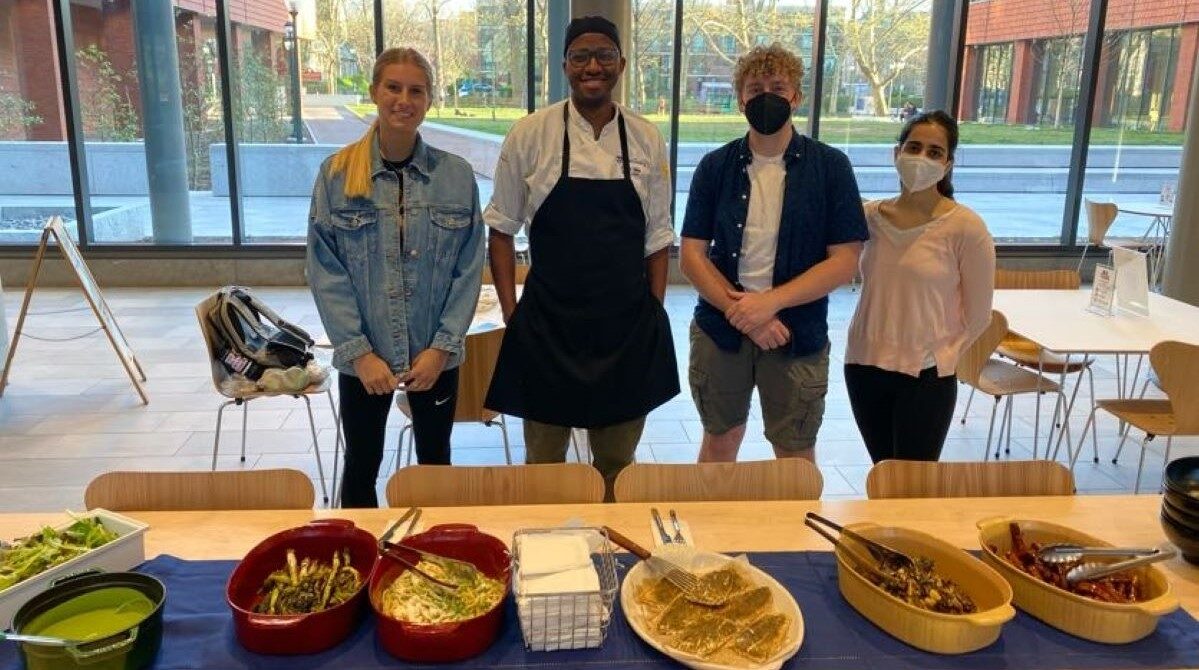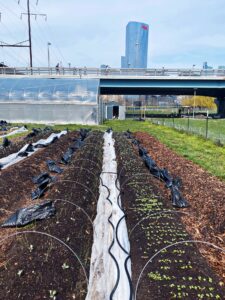A Spring Harvest Dinner at Penn’s Quaker Kitchen
- by Elise Dudley

Students pose with Sous Chef Kwazi Hlela (second from left)
Led by Executive Chef Daniel Stern, the Quaker Kitchen is creating weekly food-centered opportunities for students to build community at University of Pennsylvania. Every Friday students gather together in Quaker Kitchen to prepare and share a meal, but this particular week was distinct. Through a partnership with Penn’s campus farm, a unique group of students were invited to enjoy a simple plant-forward meal highlighting seasonal ingredients.
Peering down from the South Street bridge, wedged between railroad tracks with the backdrop of the Philadelphia city skyline, sits University of Pennsylvania’s urban campus farm. Penn Park Farm (PPF), nearly a quarter-acre in size, is a central component of the Penn Food and Wellness Collaborative (PFWC), which is managed by PFWC Co-Founder and Coordinator Lila Bhide.
On a sunny day in early spring, Fellow Elise Dudley joined PFWC Program Coordinator Emylee Fleshman at the southernmost end of Penn Park where the campus farm and orchard project are tucked away. Once a student intern on the farm, Emylee has since joined Penn Park Farm full time helping manage the farm and crew of interns for day-to-day operations.

The Philadelphia skyline looms over the Penn Park Farm
Emylee shared about the history of the young campus farm, which emerged from Wellness at Penn’s “Your Big Idea” challenge in 2019. Prior to the Lila’s proposal being awarded with grant funding, a small community garden was the only food-producing space on campus. The farm launched late in the summer of 2020, breaking ground amidst the pandemic, and the budding team raised a hoop house and community of students. Currently their harvest feeds the surrounding community of students and West Philadelphia residents in partnership with community organizations, Penn’s First Generation Low Income (FGLI) Program students, and the Agatston Urban Nutrition Initiative (AUNI).
Emylee and Elise continued to chat as they removed row covers and generously watered a dozen beds of spring crops including bok choy, leeks, peas, scallions, lettuce, and garlic. Later that afternoon, a volunteer with AUNI stopped by to pick up their weekly donation of freshly harvested produce, including beautiful rainbow Swiss chard for the Good Food Bag program. AUNI is a program of the Netter Center for Community Partnerships at Penn, created to promote healthy communities and food system sustainability through nutrition education and food access for both Penn students and community members. Each week, Good Food Bag recipients receive five-pound bags of fresh, locally grown, chemical-free produce.
After a day on the farm, Elise made her way to Quaker Kitchen, housed within New College House Residence Hall, for the Earth Week Spring Harvest Dinner, gathering Good Food Bag students for an evening of cooking and conversation.
A New Kind of “Home” Cooking
Stepping into Quaker Kitchen, it is immediately apparent this is not your average university dining hall. The space is deliberately designed to foster a homey dining experience for students. This is accomplished through weekly cooking demonstrations by Executive Chef Dan Stern, evening dinner service, and numerous thoughtful touches such as a station to rinse your plate, as if you were in your own kitchen at home. Serving as a meeting place for students at Penn, community building occurs over homecooked meals while providing the opportunity to build deeper relationships with knowledgeable dining staff that serve them each day.

Students look on as Kwazi shows off cooking techniques
Sous Chef Kwazi Hlela gathered students in Quaker’s open layout kitchen to get them involved with slicing, sautéing, stirring, and plating the various components of the dinner. The students in attendance, who all cook for themselves with veggies from the Good Food Bag each week, were inquisitive about cooking techniques. Kwazi offered light-hearted advice encouraging the fledgling chefs to think creatively and have fun in their kitchens.
After an hour or so of cooking together, students set the table and sat down to enjoy a family-style meal of blistered scallions with caramelized onions, roasted maitake mushrooms, pancetta carbonara, glazed carrots, cauliflower, pea soup, and tatsoi salad. Nearly every student in attendance was an international student, bringing unique perspectives to dinner conversation about the role of food in their daily lives and cultures, the joy and burden of feeding oneself, and how the American food system contrasts with students’ home countries of Thailand, India, China, and Slovakia.
As Dan looks forward to future semesters, he has bright visions for the space. One idea includes further collaboration with the Penn Park Farm to dry herbs from the summer season, then use them throughout the academic year. By dedicating space and resources for students to develop crucial skills to feed themselves well, Quaker Kitchen is raising the bar for higher education one meal at a time.